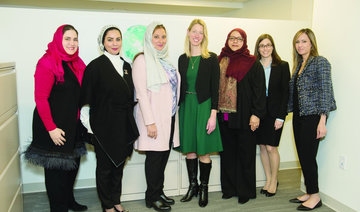DUBAI: It is not surprising that Khaled Almaeena still gets stopped in the street and asked about Arab News — even when he is abroad in places like New York or Canada.
The 63-year-old veteran Saudi journalist certainly knows the newspaper better than most. He served as its editor in chief twice — between 1982 and 1993, and again between 1998 and 2011 — and in November 2016 was given the honorary title of “editor emeritus” by current Editor in Chief Faisal J. Abbas.
Almaeena will on Tuesday be honored at the second International Media Gala (IMG), organized by Arab News and held in Dubai.
The former editor of this newspaper is set to receive a lifetime achievement award at the event, held to coincide with the first day of the Arab Media Forum.
He said on the eve of the event that Arab News has always been “a beacon” for the people.
“It stood for the voice of truth, moderation; it stood for people’s rights … for justice, and those who are not privileged. We fought hard for labor rights, women’s rights,” he said.
Under Almaeena’s watch, the paper developed strong ties with its readers, sometimes fighting causes on their behalf — including cases where people were wrongly sent to jail.
“It was a 24-hour job,” the former editor said during an earlier interview in Jeddah’s Amara Café.
“People would come to my house, saying that their sponsor hadn’t paid their money (or) the police had done this or that.”
The veteran Saudi journalist is not known for a shortage of colorful anecdotes, and they come especially freely as he talks through the significance of Arab News’ anniversary.
“It has succeeded, it has survived, it has grown,” Almaeena said of the newspaper. “Despite the many challenges that we went through, it has been able to make its mark.”
Over black coffee — the staple liquid sustenance of many a journalist — Almaeena explained how queues of people used to form outside the newspaper’s offices and those of its owners.
The daily was nicknamed “The Green Truth” — partly due to the green wash of its front page — and its top man was dubbed the “People’s Editor.”
Almaeena reels off several examples of why such a title was fitting. Many years ago, an Asian man contacted him in a desperate state.
“He said to me that if I didn’t see him that evening at 6 p.m. he would commit suicide,” Almaeena recounted.
That evening, the man told Almaeena how his mother-in-law used to beat him and take his monthly salary — making his life a misery.
“I said, ‘what do I have to do with it?’. And he said, ‘You are the Arab News, where do I go?’,” Almaeena explained.
The solution was human, helpful and somewhat mischievous — all qualities that the former editor himself exudes. Almaeena asked a friend to call the man’s mother-in-law, pretending he was from an official office, and told her to stop beating the man or face deportation.
The ruse worked, and the woman stopped the beatings. Some time later the man got a Green Card to move to the US — and Almaeena received Eid greeting messages from him for years afterward.
This was just one example of how Almaeena and Arab News helped members of the community, fighting for human causes and investigating social issues.
“People coming from outside had no access to the Saudi authorities, so whenever they had any problem they would write to us. So we became like an agony column for a lot of them,” said Almaeena.
“The role of the newspaper was to give hope to the people here. I used to get letters from prison, we got people out of prison… There were many people who would write to us.”
He still gets asked about Arab News in his native Saudi Arabia — and even when traveling abroad in the US or Canada.
“Still people write to me … An Egyptian gentleman came to me and told me that his sponsor is giving him hell. And I said, ‘why did you come to me?’ And he said, ‘you were the guy at Arab News helping (people).’”

Khaled Almaeena, 63, was dubbed the “People’s Editor” during his time editing Arab News. (AN Photo)
Blood, sweat and tears
Almaeena did not begin his career in journalism, but had a love of languages and reading from an early age.
He grew up reading English-language papers like The Times and The Guardian, and attended a strict school in Karachi, where he said “they instilled in us discipline and caring for others.”
Upon returning to Saudi Arabia, he landed a job at Saudi Arabian Airlines (Saudia). He started reading the Arab News, and gradually his career path moved toward journalism, starting with some radio reporting, before writing for the Saudi Gazette newspaper.
He was asked — just “by chance,” Almaeena said modestly — to become the editor in chief of Arab News in 1982, beginning the first of two stints as the newspaper’s longest-serving editor.
“It was blood, sweat and tears all the way. I remember when I joined … the circulation was about 6,000 — this was June of 1982. In September it went to 27,000.”
“Working in Arab News in those days was a passion ... all those who worked in the SRPC (Saudi Research and Publishing Company) felt they owned the company,” he said. “The founders and publishers — the legendary Hafiz brothers, Hisham and Muhammad Ali — were craftsmen. They embodied all the noble ideals and exhibited compassion and empathy. They took tough decisions and were known to encourage ideas and innovation.”
The readership was doubtless boosted by the paper’s engagement with its readers — developed, sometimes, through slightly mischievous means.
Almaeena’s early editorship coincided with the Falklands War — which, conscious of the number of Britons working in Saudi Arabia, Almaeena insisted on calling the “Malvinas War,” as it is known in Argentina.
“It was a deliberate attempt … The Brits used to get angry, and that was the start of ‘Letters to the Editor’,” Almaeena said. The practice even prompted Sir James Craig, the British ambassador at the time, to write in to the newspaper, something Almaeena said was unprecedented in the Saudi press.
The Gulf war
The Gulf war represented both the high, and low point of Almaeena’s editorship of Arab News.
When Saddam Hussein invaded Kuwait on Aug. 2, 1990, it sparked the news story of the decade for Almaeena. It was also one he was almost banned from writing.
“The minister of information called us on Aug. 2, 1990 and said not to write that Iraq had invaded Kuwait. I suffered all kinds of mini strokes in my mind,” Almaeena recalled.
“So I went to him… and I told him that ‘I will kiss your hand, Mr. Minister. The world knows that Saddam is in Kuwait... And you’re asking me not to write?’. I couldn’t do that.
“To me, I think that was the worst day of my life, even in my personal life. Because I couldn’t live with it.”
In the end, Almaeena got around the ban by carrying a headline that suggested all was not well in Kuwait — yet some of his fellow newspaper editors were not so bold.
“There were some other editors, poor people, who had to write ‘production of strawberries is on the rise’, and stuff like that,” he said. “We had to tell the truth. I could never be a toady, or curry favors with people.”
Despite that attempted interference by the government, Almaeena said that the Saudi kings — most of whom he met over the course of his career and personal life, given his family’s close historical ties with the royal family — had never interfered with the newspaper. “They never told you what you wrote, what you didn’t write,” he said.
CNN calling
While the first day of the Gulf War was the low point, the conflict also proved a highlight of Almaeena’s editorship, and helped put Arab News on the map.
Almaeena formed a team with editors of other publications to cover the invasion, moving the newspaper’s HQ to Saudi Arabia’s Eastern Province.
The newspaper ended up becoming a reference point for the international media covering the Gulf War, with famous journalists such as Christiane Amanpour, Katie Couric, Deborah Amos and the late Bob Simon seeking out information from Arab News.
“All these people came, because we were a source of news,” said Almaeena. “That put Arab News right on the map. I think that was the turning point of Arab News, in 1990, when CNN (was quoting) us.”
More than 20 years later, Almaeena was editing Arab News — for the second time — when the 9/11 terror attack hit the US. Given this was now the Internet age, many people were searching for “Arab” stories online, and the newspaper’s name naturally popped up in the results. In the space of one week, the newspaper received thousands of hate-mail messages, many using foul language. But Almaeena got a team of volunteers together to reply, at least to those using civil language, to calm them and explain the newspaper’s position.
The future
Almaeena is now managing partner of a communications company and has several other interests including social work and mentoring. Although he still writes, he does not miss the daily grind of journalism.
“I don’t miss the headlines and deadlines,” he said.
That said, Almaeena sees a solid future for Arab News, of which he is editor emeritus.
“Arab News has always been a bridge between the expatriates, the Saudis and the government.
“I truly believe it can play a role, because now they are online, and the paper can really go ahead and do it.”
“But we have to be seen as an independent voice: Accurate, factual and not afraid to speak out when it needs to be done.”
And speaking out is something that Almaeena himself, over the course of his career, has certainly excelled in.
* Parts of this interview were originally published in April 2017


























